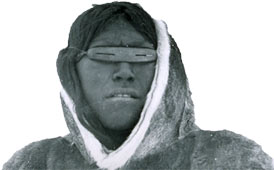Recently I came across a bit of a celebration with regard to the passage in the Alaska House (which at this moment is presiding over Alaska’s historic budgetary meltdown) of HB275, a bill that provides for an Inidigenous People’s Day in Alaska. Super… I am excited any time something that is not overwhelmingly toxic passes either chamber of the Alaska Legislature. But upon review of the bill (which I found a bit confusing – here you check for yourself – http://www.legis.state.ak.us/basis/get_bill_text.asp?hsid=HB0275C&session=29) I was left in the lurch: what is the definition of indigenous people, and if it is defined with respect to a window of immigration as to a specific geography, what are the specifics as to that window and that geography? – Are we in fact rejecting the late arriving Inuit, who came to Alaska thousands of years after most of Beringia popped on in? Inquiring minds and all…
A friend argued that Harriet (Harriet Drummond, the Democratic Representative who introduced the bill, and the gracious lady who allows my friend to co-habit with her on occasion),
walks through and names the Tribes affected. She discusses science and engineering and traditional knowledge that need to be part of a paradigm of rational discourse framing solutions for the future. The epistemology analysis of Dr. Oscar Kwagley suggests a trans-personal logic that is not consensual but imperative. Dr. Kleinfeld’s monograph suggesting spatial intelligence, a useful skill when applied to the White Alice Sites in the 1950s, might have relevance to the multi-layered challenges of Arctic and Northern development. Harriet’s point: engaging the indigenous knowledge network is not mere tokenism but a potentially critical part of our socioeconomic future.
Uh-oh! Despite what some of you may think, I take what my friends say (well, at least what some of my friends say) seriously (perhaps that is one reason I don’t have …. well that IS another story…) so I understood that an substantive response must be tendered, and thus I find myself here, writing to myself about stuff that few, if any, would consider, were it not for its very provocative implications (which have a tendency, as provocative shit does, to run off with us). But that is perhaps why Raven loves old farts; we hang around for the punch line. So off we go!
Unfortunately Judith’s work in this area (Kleinfeld, 1973) is predicated on a dubious framework (multiple intelligences, etc) that produces lots of theoretical conjecture and, frankly, no evidentiary support. Nevertheless, it DOES seem to coddle the views of Jensen et al. (a fact that appears to tickle her funny bone, though I think many would be indignant at her playfulness). Even without such aggravation, the horrific looks on the faces of those attending sessions of the local (Anchorage) RTI conferences in past years when experts actually explained the impact of non-verbal culture on children was a sight to behold, lol. In sum, while there are some intellectual curiosities for some of us to ponder there, Judith presents a Pandora’s box, a box perhaps best left unopened?
That is not to say that any data or perspective should be ignored, and narrow-minded disregard for data is problematic, even when it mandates racially segregated health centers wink emoticon But orally collected and transmitted data is demonstrably dubious at best and while some of it could be very accurate, it would be difficult to distinguish the noise from the signal. Compare our consternation over the literature of the Abrahamic religions and you can see how utterly impossible it becomes in just hundreds of years, let alone thousands.
 As far as Oscar is concerned, I have chatted about “Native ways of knowing” before. Unfortunately, much of the discussion revolving around such argument may be important as an aspect of Native cultural identity, but pales beyond that. In fact, it is the SAME argument that Christian apologists use to dispute the efficacy of science, lol. Unfortunately for them, their arguments are devastated because their premise is unfounded, the same premise Oscar argues, that science presumes a specific worldview and set of religious beliefs. But science is agnostic.
As far as Oscar is concerned, I have chatted about “Native ways of knowing” before. Unfortunately, much of the discussion revolving around such argument may be important as an aspect of Native cultural identity, but pales beyond that. In fact, it is the SAME argument that Christian apologists use to dispute the efficacy of science, lol. Unfortunately for them, their arguments are devastated because their premise is unfounded, the same premise Oscar argues, that science presumes a specific worldview and set of religious beliefs. But science is agnostic.
I am certainly NOT suggesting that scientific inquiry can be ignored simply because of the tradition in which it was pursued (though the context and constraints of such tradition must be taken into account.) By way of example, cultural empiricism such as described by Kim Tingley (2016) can happily be reconciled with modern geophysics.
Kleinfeld, J. S. “Intellectual Strengths in Culturally Different Groups: An Eskimo Illustration.” Review of Educational Research 43, no. 3 (1973): 341–359. Accessed April 1, 2016. http://www.jstor.org/stable/1170109.
Tingley, Kim. “The Secrets of the Wave Pilots.” The New York Times, March 17, 2016. Accessed April 2, 2016. http://www.nytimes.com/2016/03/20/magazine/the-secrets-of-the-wave-pilots.html.
